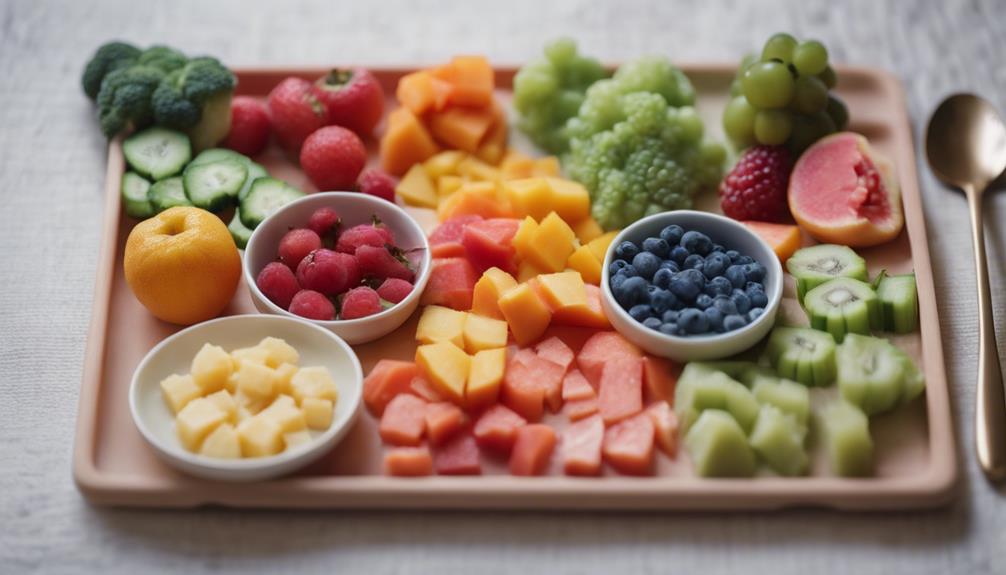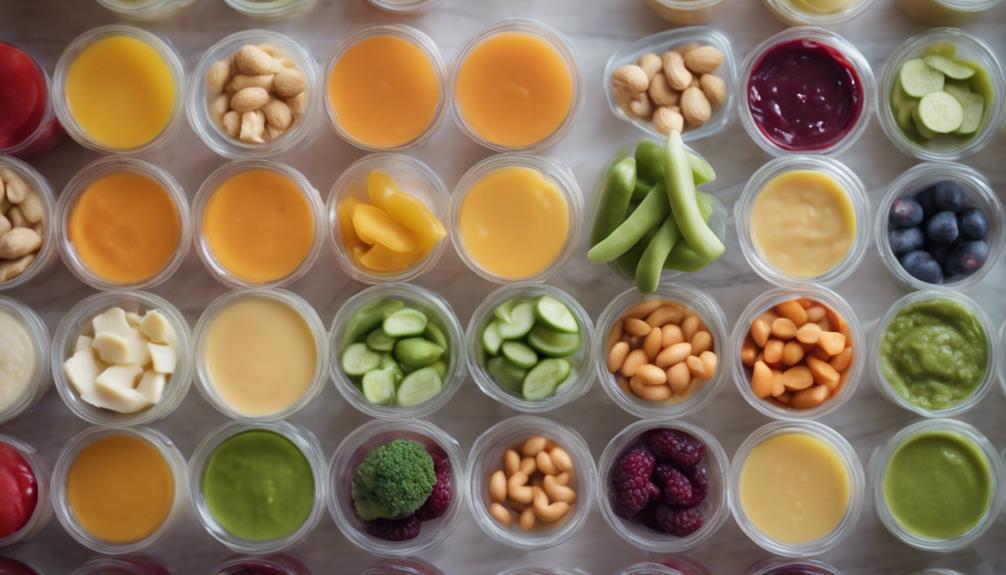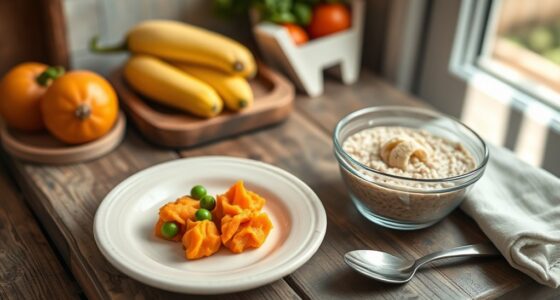Learn key baby feeding tips for optimal growth. Breastfeeding helps provide antibodies and essential nutrients, endorsed by the American Academy of Pediatrics for bonding and immune support. Pay attention to hunger cues such as rooting reflex, ensuring quick responses and monitoring signs of fullness. Use correct latch techniques to prevent soreness and ensure effective milk transfer. When bottle feeding, use the appropriate nipple sizes, hold the bottle at a 45-degree angle, and burp the baby to minimize colic. Gradually introduce solids, such as purees and different textures, around 6 months. For more detailed advice on baby feeding, delve into additional information on homemade baby food and foods that may cause allergies.
Key Takeaways
- Respond promptly to hunger cues for a healthy routine.
- Ensure a proper latch for adequate milk intake.
- Choose the right bottle nipple size for the baby's age.
- Start solids around 6 months with single-ingredient purees.
- Hold the bottle at a 45-degree angle to reduce air intake.
Breastfeeding Vs. Formula Feeding
When deciding between breastfeeding and formula feeding, consider the individual benefits and considerations of each option. Breastfeeding provides antibodies and essential nutrients that help minimize the risk of infections for your baby. According to the American Academy of Pediatrics, breast milk is the ideal nutrition for infants as it promotes bonding between mother and child.
On the other hand, formula feeding offers suitable alternatives like cow's milk-based, soy, and hydrolyzed formulas for specific dietary needs. It's important to note that formula-fed infants need precise amounts of formula at different ages to guarantee proper nutrition and growth.
While breastfeeding is cost-effective and has long-term health benefits for both you and your baby, formula feeding can also be a practical choice for some families. If you have any concerns or need guidance, consider consulting a lactation consultant for personalized advice on infant nutrition and feeding options.
Monitoring Hunger Cues
To effectively monitor your baby's hunger cues, observe for signs such as rooting reflex, hand-to-mouth movements, and increased alertness. Responding promptly to these hunger cues by feeding on demand in the early weeks is essential for establishing a healthy feeding routine.
It's important to be attentive to your baby's signals of fullness during feedings and to stop feeding when these signs are present to prevent overfeeding. Monitoring weight gain and observing contentment between feedings are also key indicators of healthy feeding patterns.
A steady increase in weight and a satisfied demeanor post-feeding signify that your baby is receiving adequate nutrition. By the fifth day, your baby should be having at least 6 wet diapers and 3 bowel movements daily, confirming that they're getting enough to eat.
Proper Latch Techniques
Achieving a proper latch is essential for successful breastfeeding, ensuring your baby receives adequate milk and preventing nipple soreness. To establish a good latch, observe that your baby's mouth covers not just the nipple but also a significant portion of the areola. Listen for swallowing sounds, indicating that your baby is effectively extracting milk.
An improper latch can lead to various feeding issues, such as low milk supply and discomfort for both you and your baby. If you encounter difficulties with latching, consider seeking guidance from a lactation consultant. They can provide valuable support and assistance in overcoming breastfeeding challenges.
Bottle Feeding Guidelines
- Choose the appropriate bottle nipple size and shape for your baby's age and feeding style.
- Hold the bottle at a 45-degree angle to minimize air intake and decrease the likelihood of colic.
- Remember to burp your baby frequently during bottle feeding to prevent discomfort and aid digestion.
To guarantee successful bottle feeding, make sure the bottle nipple is the right size and shape for your baby's age and feeding style. Holding the bottle at a 45-degree angle can help prevent air intake, reducing the risk of colic.
Remember to burp your baby frequently during bottle feeding to release trapped air and prevent discomfort. Avoid propping the bottle to feed your baby; always hold them securely during feeding.
It's crucial to clean and sterilize bottles, nipples, and other feeding accessories regularly to maintain hygiene and prevent infections.
Introducing Solid Foods

When introducing solid foods to your baby around 6 months of age, focus on meeting their increasing nutritional needs. Start with single-ingredient purees like vegetables or fruits and gradually introduce new foods every few days. This helps you monitor for potential allergies or intolerances.
Offering a variety of textures and flavors can expand your baby's palate and encourage healthy eating habits. Look for signs of readiness such as sitting up unassisted and showing interest in food before introducing solids.
According to pediatrician Dr. Smith, 'Introducing solid foods at around 6 months is vital for meeting your baby's nutritional requirements.' Remember to introduce different food groups to promote a balanced diet.
Pediatric nutritionist Sarah recommends, 'Expose your baby to a wide range of flavors early on to establish healthy eating habits.' Be cautious when introducing common allergenic foods like nuts, eggs, and dairy, and consult your pediatrician if you have concerns about potential allergies.
Homemade Baby Food & Allergenic Foods

When it comes to introducing allergenic foods to your baby, like peanuts, eggs, and dairy, the recommendation is to start around 6 months to reduce the risk of allergies, according to the American Academy of Pediatrics.
Making homemade baby food is a great way to provide nutrient-rich options for your little one, using blenders or food processors to create delicious purees.
Freezing individual portions of homemade baby food in ice cube trays allows for convenient and easy serving, ensuring your baby gets a variety of flavors and nutrients.
Introducing Allergenic Foods
Consider introducing allergenic foods like peanuts, eggs, and dairy to your baby around 6 months of age to potentially reduce the risk of allergies. Early exposure to allergenic foods can actually help prevent allergies and sensitivities in infants.
When introducing these foods, offer them separately and wait a few days before introducing a new one to monitor for any reactions that may occur.
To ensure the safest introduction of allergenic foods, homemade baby food can be a great option. Making your own baby food allows for better control of the ingredients being used and how they're introduced to your baby's diet.
However, it's important to consult with a pediatrician before introducing allergenic foods to your baby. Your pediatrician can provide guidance on the safest timing and method to introduce these foods, taking into consideration your baby's individual health needs.
Benefits of Homemade Food
Making your own baby food at home offers numerous benefits, including the ability to regulate ingredients, guarantee freshness and quality, and introduce a wider range of nutrients and flavors to your baby's diet.
By preparing homemade baby food, you have full control over what goes into your little one's meals, ensuring that only the freshest and highest quality ingredients are used. This can be particularly important when considering allergenic foods, as introducing them early can help reduce the risk of allergies in infants.
Additionally, making baby food at home is often more cost-effective than purchasing commercial options, allowing you to provide nutritious meals for your baby without breaking the bank.
Pureeing foods at home not only enables you to tailor the texture and flavors to suit your baby's preferences but also exposes them to a broader spectrum of nutrients essential for their growth and development.
Consider the benefits of homemade baby food as a cost-effective, nutritious, and customizable option for your little one's diet.
Frequently Asked Questions
What Are the 5 Most Important Things I Need to Know About Taking Care of Infants?
You need to feed newborns every 2-3 hours, watch for early hunger cues, guarantee 6 wet diapers and 3 bowel movements by day five, avoid water/juice, and consult about vitamin D supplements with the doctor.
What Do New Parents Need to Know About Bottle Feeding Their Baby?
When bottle feeding your baby, choose the right formula for their needs, clean and sterilize bottles properly, and involve other caregivers for bonding. Consult with experts for guidance on feeding techniques and schedules to guarantee your baby's health.
What Should the Mother Be Taught Regarding Infant Feeding?
You should learn about the importance of breastfeeding for the first 6 months, proper techniques like a good latch, monitoring baby's cues, benefits for immune system and bonding. Address challenges like engorgement and seek healthcare support.
What Are the Recommendations for Infant Feeding Practices?
For infant feeding practices, breastfeed for the first 6 months or use formula as needed. Introduce solids around 6 months, starting simple. Hold baby upright, avoid propping bottles, practice responsive feeding, and seek healthcare advice for challenges.
Conclusion
In summary, remember that feeding your baby is a vital aspect of their development.
Just as a gardener tends to their plants with care and attention, so too must you nurture your little one with the right nutrients and feeding techniques.
By following these essential tips, you can guarantee that your baby grows strong and healthy, laying the foundation for a lifetime of good health.
Remember, a well-fed baby is a happy baby.










